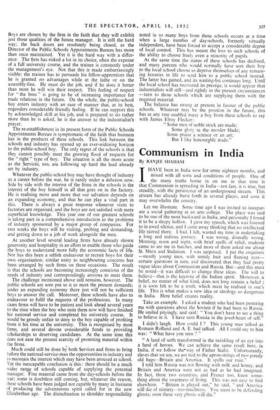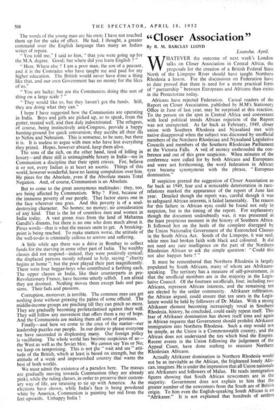Communism in India
By RANJEE SHAHANI
1- HAVE been in India now for some eighteen months, and mixed with all sorts and conditions of people. One of the many truths borne in on me in that time is that Communism is spreading in India—not fast, it is true, but steadily, with the persistence of an underground stream. This stream has already burst forth in several places, and soon it may overwhelm the country.
Let me illustrate. Some time ago I was invited to inaugur- ate a social gathering at an arts college. The place was said to be one of the most backward in India, and personally I found it to be a sleepy hollow. I gave my speech, which was listened to in awed silence, and I came away thinking that no intellectual life stirred there. I had, I felt, wasted my time in undertaking a long and tedious journey. I was wrong, dismally wrong. Morning, noon and night, with brief spells of relief, students came to see me in batches, and most of them asked me about St. Marx and Stalinism. I was surprised. I put the enquirers —mostly young men, with untidy hair and flaming eyes— certain questions in turn, and discovered that they had pretty vague ideas about Communism and Russia. But—and this must be noted—it was difficult to change these ideas. The will to 'believe—that is the keynote of the Indian spirit. Moreover, a belief, no matter of what kind, does not long remain a belief ; it is soon felt to be a truth, which must be realised in one's life. This is what makes a new idea or ideology so dangerous in India. Here belief creates reality.
Take an example. I asked a student who had been pestering me with questions about the Soviets if he had been to Russia. He smiled pityingly, and said : "You don't have to see a thing to believe in it. I have seen Russia in the jewel-heart of self."
I didn't laugh. How could I? This young man talked as Romain Rolland and A. E. had talked. All I could say to him was: "What have you seen ? "
"A land of serfs transformed in the twinkling of an eye into a land of heroes. We can achieve the same result here, in India, if we follow the way of Father Stalin. Unfortunately, slaves that we are, we are tied to the apron-strings of two greedy old hags—Britain and America. It spells our ruin."
I told him Russia was not flowing with milk and honey, and Britain and America were not as bad as he had imagined. In fact, these two countries, and France too, knew some- thing about the sweetness of living. This was not easy to find elsewhere. "Britain is played out," he said, "and America will die of nimiety—too-muchness. You seem to be defending ghosts; soon these very ghosts will die." The words of the young man are his own; I have not touched them up for the sake of effect. He had, I thought, a greater command over the English language than many an Indian writer of repute.
"You told me," I said to him, "that you were going up for the M.A. degree. Good; but where did you learn English ? "
"Here. Where else ? I am a poor man, the son of a peasant, and it is the Comrades who have taught me and paid for my higher education. The British would never have done a thing like that, and our own Government has no money for the likes of us."
"You are lucky; but are the Communists doing this sort of thing on a large scale ? "
"They would like to, but they haven't got the funds. Still, they are doing what they can."
I hope I have suggested how the Communists are operating in India. Boys and girls are picked up, so to speak, from the gutter, treated well, and then duly indoctrinated. The refugees, of course, being instinctively anti-Congress, provide a happy hunting-ground for quick conversion; they ascribe all their ills to Nehru and Nehruism. This is nonsense, to be sure, but there it is. It is useless to argue with men who have lost everything they prized. Hopes, however absurd, keep them alive.
The sons of the rich, on the other hand, tired of lolling in luxury—and there still is unimaginable luxury in India—see in Communism a discipline that their spirit craves. For, believe it or not, every Indian is at heart an ascetic. Things of this world, however wonderful, have no lasting compulsion over him. He pines for the Absolute, even if the Absolute means Total Negation. And, of course, Communism is an Absolute.
But to come to the great anonymous multitudes : they, too, are being affected by Communism. Why ? First, because of the immense poverty of our people. That factor stares one in the face wherever one goes. And this poverty is of a soul- destroying character. No homes; no money; no consideration of any kind. That is the lot of countless men and women in India today. A vast groan rises from the land of Mahatma Gandhi's dreams, but there is no one who does much about it. Pious words—that is what the masses seem to get. A breaking- point is being reached. To make matters worse, the attitude of the well-to-do is criminally callous to sorrow and suffering.
It little while ago there was a drive in Bombay to collect funds for the starving in some other part of India. The wealthy classes did not respond—indeed, they were positively cynical; the displaced persons mostly refused to help, saying "charity begins at home "; but the poor played their part magnificently. There were four beggar-boys who contributed a farthing each. The upper classes in India, like their counterparts in pre- Revolutionary France, have become utterly selfish. I am afraid they are doomed. Nothing moves them except fads and pas- sions. Their fads and passions.
Corruption, moreover, is terrible. The common man can get nothing done without greasing the palms of some official. The middle-income groups are pinching till they can pinch no more. They are gradually becoming proletarianised against their will. They will follow any movement that offers them a ray of hope. And the Communists are making them all sorts of promises.
Finally—and here we come to the crux of the matter—our leadership puzzles our people. In our desire to please everyone we have succeeded in displeasing many. Our foreign policy is vacillating. The whole world has become suspicious of us— the West as well as the Soviet bloc. We cannot say Yes or No; we keep on temporising. This is not the "wait and see" atti- tude of the British, which at least is based on strength, but the attitude of a weak and impoverished country that wants the best of both worlds.
We must admit the existence of a paradox here. The masses are gradually moving towards Communism (they are already pink), while the ruling classes, in order to preserve their custom- ary way of life, are straining to tie up with America. As the elections have shown, while India's face is being powdered white by America, Communism is painting her red from the feet upwards. Unhappy India ! •



































 Previous page
Previous page